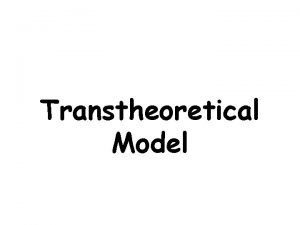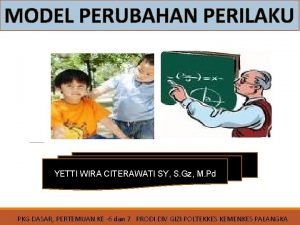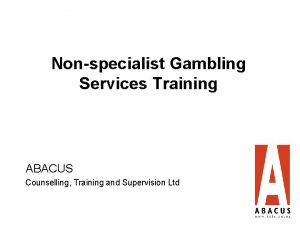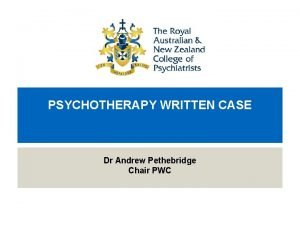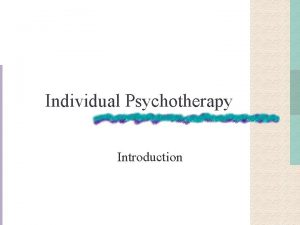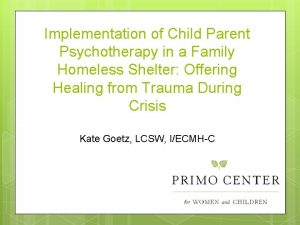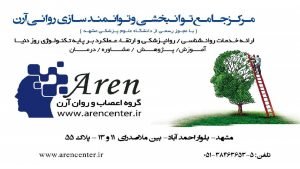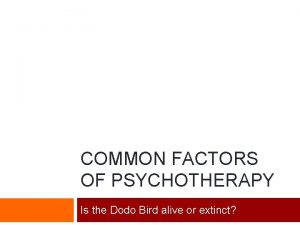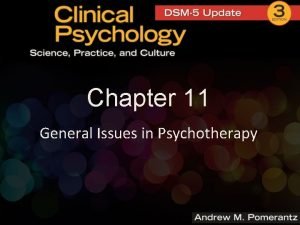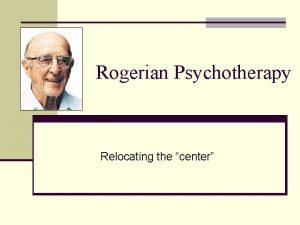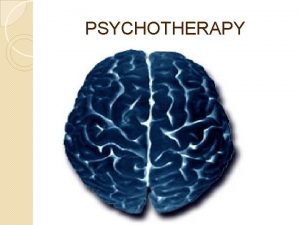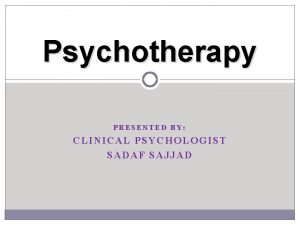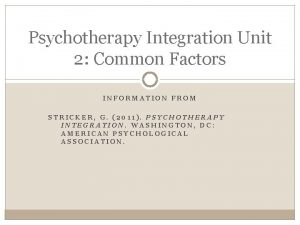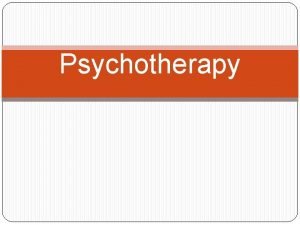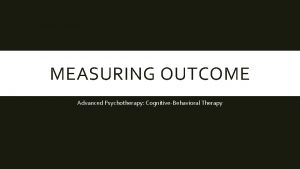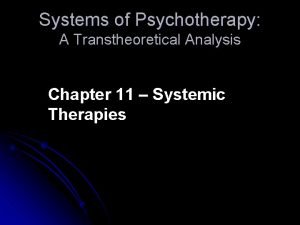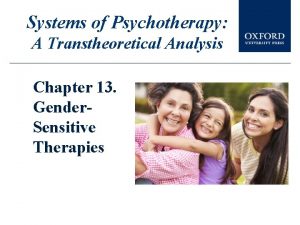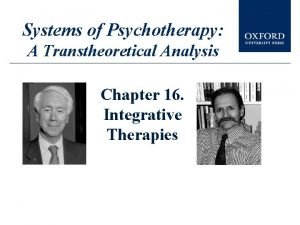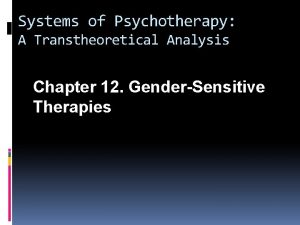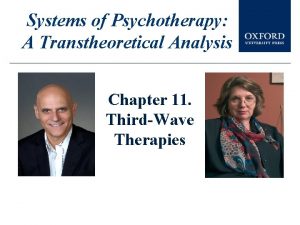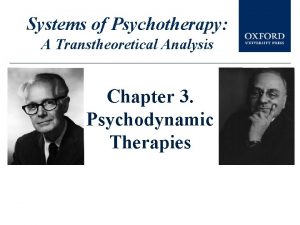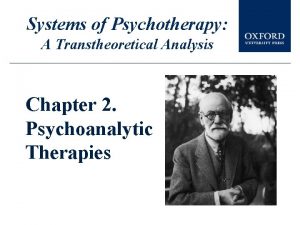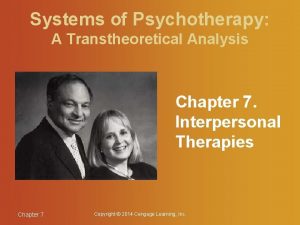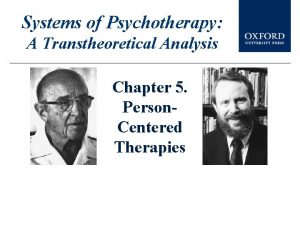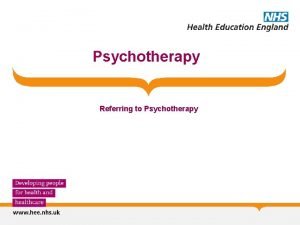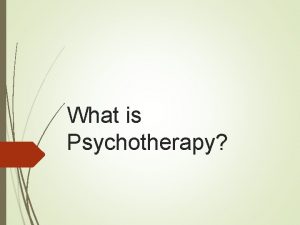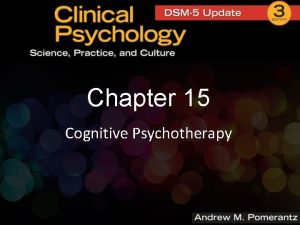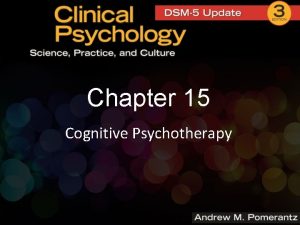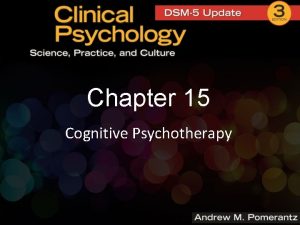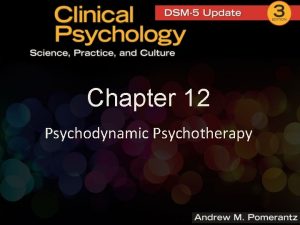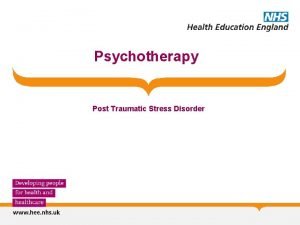Systems of Psychotherapy A Transtheoretical Analysis Chapter 7






















- Slides: 22

Systems of Psychotherapy: A Transtheoretical Analysis Chapter 7. Interpersonal Therapies

A Sketch of Interpersonal Psychotherapy (IPT) ♦ Developed in early 1970’s by Gerald Klerman & colleagues ♦ Originally intended as treatment for depression ♦ Established in the research heritage ♦ Myrna Weisssman & John Markowitz updated treatment manual after Klerman’s death

Theory of Personality ♦ There is not a detailed theory of personality ♦ Substitutes stable interpersonal patterns for stable personality patterns ♦ Therapy designed to alter interpersonal patterns developed early in life ♦ Healthy relationships early in life predispose healthy relationships later in life

Theory of Psychopathology ♦ Relationships affect mood, & mood affects relationships ♦ Interpersonal disruption causes & results from depression ♦ Disorders surface when situational stressors expose inability to cope

4 Major Interpersonal Problems ♦ Interpersonal losses (e. g. , a loved one) ♦ Disputes (incompatible expectations of a relationship) ♦ Transitions (e. g. , loss of job) ♦ Deficits (trouble forming & maintaining relationships)

IPT is ♦ Time-limited ♦ Focused ♦ About current relats ♦ Interpersonal ♦ Improving relationships ♦ Identifying assets ♦ Learning how to cope IPT is not ♦ Long-term ♦ Open-ended ♦ About past relationships ♦ Intrapsychic ♦ Cognitive/behavioral ♦ Achieving insight ♦ Identifying defenses ♦ Curing the problem

Therapeutic Processes ♦ Consciousness raising, catharsis, and conditional stimuli predominate ♦ Short-term, present-oriented therapy ♦ Therapist remains focused on primary problem ♦ No ideological hesitation to use medication; compatible with combined treatment

Brief IPT ♦ 12 - to 16 -week duration ♦ Weekly face to face ♦ Present–oriented ♦ Focus on recovery (not character change) ♦ Provides protection against reemergence of symptoms

Therapeutic Content Intrapersonal Conflicts ♦ Anxieties & defenses ♦ Self-esteem ♦ Responsibility Interpersonal Conflicts ♦ Intimacy & sexuality ♦ Communication ♦ Hostility ♦ Control

Therapeutic Content (cont. ) Indivduo-Social Conflicts ♦ Adjustment versus transcendence ♦ Impulse control Beyond Conflict to Fulfillment ♦ Meaning

Therapeutic Relationship ♦ Patient advocate, not neutral commentator ♦ Therapist assumes expert role ♦ Not a manifestation of transference ♦ IPT rarely analyzes the interpersonal relationship in psychotherapy ♦ Therapist expresses empathy & warmth but not unconditional acceptance

Practicalities of IPT ♦ Best conducted by those with favorable attitude toward short-term tx & no theoretical attachment ♦ IPT typically 12 -16 weeks in duration ♦ Therapist adheres to treatment manual ♦ Disposed toward cost-efficient formats & combining therapy with medication

A Major Alterative: Transactional Analysis (TA) Personality is structured into 3 ego states ♦ Parent: both nurturing & controlling; copied from parents in childhood ♦ Child: impulsive & stimulus-bound state; present since childhood ♦ Adult: information gathering, data processing, & decision making

Games ♦ Have overt social meanings & covert psychological meanings ♦ Complex series of ulterior transactions progress to a psychological payoff ♦ Psychological payoff are feelings such as guilt, depression, or anger ♦ Examples: Kiss off, Kick me

Therapeutic Process ♦ TA helps clients achieve increased consciousness ♦ Increased consciousness allows clients to choose ego state & life position ♦ Frequently combined with systems theory in couple/family treatment ♦ Combined with Gestalt to form redecision therapy

Effectiveness of IPT ♦ Tested in hundreds of RCTs ♦ Effective for treatment of mood, eating, and anxiety disorders (but not substance abuse) ♦ Exhibits prophylactic effect for recurrence of mood disorders ♦ As effective as medication alone, but combination tx has lower relapse likelihood

Criticisms of IPT ♦ From a Cognitive-Behavioral Perspective (similar to CBT, no need for new label) ♦ From a Psychoanalytic Perspective (no theory, no relationship, no goals, only symptom alleviation) ♦ From a Humanistic Perspective (TA strengthens fragmentation) ♦ From a Cultural Perspective (too individualistic, lack of diversity) ♦ From an Integrative Perspective (too common, lacks passion and depth)

Future Directions of IPT ♦ Increasingly popular orientation (while TA waning) ♦ Broadened to other age groups and disorders ♦ Compatible and concurrent with pharmacotherapy ♦ Briefer IPT rendered by nurse practitioners

Key Terms attachment styles bibliotherapy combined treatment dissolution ego state expressed emotion (EE) games (people play) impasse interpersonal psychotherapy (IPT) interpersonal school of psychoanalysis life positions NIMH Collaborative Treatment Study Parent-Adult-Child (PAC) participant-observer payoff primary problem area

Key Terms (Cont. ) randomized clinical trials (RCTs) redecision therapy renegotiation ritual role disputes role transitions stroking structural analysis switch transactional analysis (TA) transactions

Recommended Websites ♦ Interpersonal Psychotherapy Institute: www. iptinstitute. com ♦ International Society for Interpersonal Psychotherapy: www. interpersonalpsychotherapy. org/ ♦ International Transactional Analysis Association: www. itaa-net. org ♦ Society for Interpersonal Theory and Research (SITAR): www. sitarsociety. org ♦ United States of America Transactional Analysis Association: www. usataa. org

 The transtheoretical model
The transtheoretical model Model perubahan perilaku
Model perubahan perilaku Termination transtheoretical model
Termination transtheoretical model Transtheoretical model of behaviour change
Transtheoretical model of behaviour change Transtheoretical model of behaviour change
Transtheoretical model of behaviour change What are the difference between guidance and counselling
What are the difference between guidance and counselling Ranzcp psychotherapy written case
Ranzcp psychotherapy written case Flooding ap psychology
Flooding ap psychology Re-educative individual psychotherapy
Re-educative individual psychotherapy Child parent psychotherapy triangle
Child parent psychotherapy triangle Hamid zolfaghari
Hamid zolfaghari Bracketing in counseling
Bracketing in counseling Everybody has won and all must have prizes
Everybody has won and all must have prizes General issues in psychotherapy
General issues in psychotherapy Carl rogers 19 propositions
Carl rogers 19 propositions Psychotherapy refers to
Psychotherapy refers to Psychotherapy definition psychology
Psychotherapy definition psychology Counselling ppt
Counselling ppt Quantum psychotherapy
Quantum psychotherapy Cognitive disputation
Cognitive disputation The common factors approach to psychotherapy integration
The common factors approach to psychotherapy integration Padesky 5 aspects. 1986
Padesky 5 aspects. 1986 Advanced psychotherapy
Advanced psychotherapy
